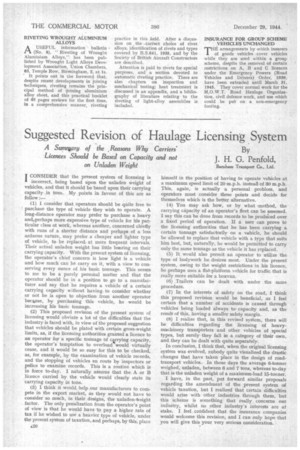I CONSIDER that the present system of licensing is incorrect,
Page 22

If you've noticed an error in this article please click here to report it so we can fix it.
being based Upon the unladen weight of vehicles, and that it should be based upon their carrying capacity in tons. My points in favour of this are as
follow :— .
(I) I consider that operators should be quite free to
purchase the type of vehicle they wish to operate. A long-distance operator may prefer to purchase a heavy and,perhaps more expensive type of vehicle for his particular class ot work, whereas another, concerned chiefly with runs of a shorter distance and perhaps of a less arduous nature, may prefer a cheaper and lighter type of vehicle, to be replaced. at more frequent intervals. Their actual unladen weight has little bearing on their carrying capacity. With the present system of licensing, the operator's chief concern is how light is a vehicle and how much can he carry on it, with a view to conserving every ounce of his basic tonnage. This seems to me to be a purely personal matter and that the operator should be in a position to go to a manufacturer and say that he requires a vehicle of a certain carrying capacity without having to consider whether or not he is open to objection from another operator because, by purchasing this vehicle, he would be increasing his basic tonnage.
(2) This proposed revision of the present system of licensing would obviate a lot of the difficulties that the industry is faced with, in view of the proposed suggestion that vehicles should be plated with certain gross-weight limits, as, if the licensing authorities granted a licence to an operator for a specific tonnage of cirrying capacity, the operator's temptation to overload would virtually cease, and it would be so easy for this to be checked, as, for example, by the examination of vehicle records, and the stopping of vehicles en route by inspectors or police to examine records. This is a routine which is in force to-clay. I naturally aisume that the. A or B licence carried by the vehicle would clearly state its carrying capacity in tons.
(3) I think it would help our manufacturers to compete in the export market, as they would not have to consider so much, in their designs, the unladen-lveight factor. The only penalization from the operator's point of view is that he would have to pay a higher rate of tax if he wished to use a heavier type of vehicle, under the present system of taxation, and perhaps, by this, place
himself in the position of having .to operate vehicles at a maximum speed limit of 20 m.p.h. insteafl of 30 m.p.h. This, again, is actually a personal problem, and operators must consider these points and decide for themselves which is the better alternative.
(4) You may ask how, or by what -method, the carrying capacity of an operator's fleet can be assessed. I say this can be done from records to be produced over a fixed period of operation. If a user can prove to the licensing authorities that he has been carrying a certain tonnage satisfactorily on a vehicle, he should be allowed to replace that vehicle with a type that suits him best, but, naturally, he would be permitted to carry only the same tonnage as the vehicle it has replaced.
(5) It would also permit an operator to utilize the type of bodywork he desires most. Under the present system, owing to the weight restrictions in his licence, he .perhaps uses a flat-platform vehicle for traffic that is really more suitable for a boxvan.
(6) .Trailers can be dealt with under the same procedure.
(7) In the interests of safety on the road, I think this proposed revision would be beneficial, as I feel certain that a number of accidents is caused through vehicles being loaded always tocapacity and, as the result of this, having a smaller safety margin. (8) I realize that, in this revised system, there will be difficulties regarding the licensing of heavymachinery transporters and other vehicles of special types, but surely they fall in a ca.tegory of their own, and they can be dealt with quite separately.
In conclusion, I think that, when the original licensing system was evolved, nobody quite visualized the drastic changes that have taken place in the design of roadtransport vehicles. In those days the average 6-tonner weighed, unladen, between 6 and 7 tons, whereas to-day that is the unladen weight of a maximum-load 15-tonner.
I have, in the past, put forward similar proposals regarding the amendment of the present system cif vehicle taxation, but I realized that certain difficulties would arise with other industries through them, but this scheme is something that really concerns our industry, whilst no other industry's interests are at stake. I feel confident that the insurance companies would welcome this revision, and I can only hope that you will give this your very serious consideration.




















































